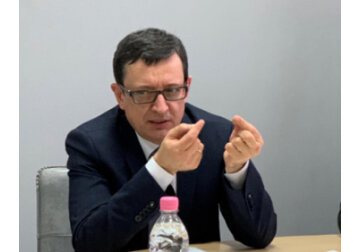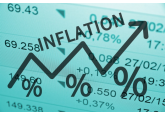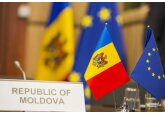
The NBM kept the base rate applied to the main short-term monetary policy operations at the same level of 21.5% per annum.
In addition, interest rates on loans and overnight deposits also remained at the same level of 23.5% and 19.5% per annum, respectively. According to the President of the National Bank Octavian Armasu, this decision was made by the NBM Executive Committee at a meeting on September 13 in the context of the extension of previously adopted restrictive monetary policy measures, the effects of which will continue to operate for a longer period, taking into account the gaps in their transmission. The head of the National Bank noted that the slowdown in annual inflation confirms the impact of previous measures, while the monthly growth is less than 1 percentage point. "Thus, today's decision of the NBM is aimed at further restraining the growth of consumer prices, mitigating the side effects of supply shocks, stimulating financial intermediation in the national currency and savings instead of consumption, balancing the trade balance, as well as fixing inflationary expectations," Octavian Armasu said. According to him, in order to reduce the pressure on the balance of payments in the cold season, caused by high import prices for energy resources, the NBM considers it necessary to rationalize the consumption of the population and effectively manage the stocks of economic agents. “We confirm that the NBM will loosen monetary policy in order to direct inflation to the target level as soon as future forecasts show reasonable prerequisites,” the head of the National Bank stressed. He noted that the new macroeconomic information largely confirms the validity of the latest inflation forecast. Thus, the annual inflation rate continued to grow, reaching 34.3% in August 2022 (0.8 percentage points higher than in July), which is slightly below the level provided in the latest forecast. The acceleration of price growth in the domestic market was due to the growth of international and regional quotations for food and energy. Adjustment of tariffs for gas, heat and electricity, rising fuel prices, as well as the upward dynamics of salaries increased the costs of economic agents, which were gradually reflected in prices. The war in Ukraine put additional pressure on food prices (also up because of this summer's drought), fuel and some components of core inflation. Demand pressure has lost its intensity. Referring to the external environment, the President of the NBM stressed that the energy crisis in Europe continues to deepen, with the price of natural gas recently exceeding $3,000 per 1,000 cubic meters. External prices for oil and foodstuffs decreased slightly; the latter are slower than expected as harvests in the northern hemisphere are uneven. The euro was falling below parity against the US dollar before the decision of the European Central Bank to raise its key rate on 8 September. The evolution of the Russian ruble remains unpredictable.Regarding economic activity, Octavian Armasu noted that although the new statistics show mixed trends in economic activity, overall they confirm the expected contraction in the second quarter of 2022. At the same time, significant conflict-related risks affect GDP dynamics in the medium term in the region. Regarding monetary conditions, the head of the National Bank drew attention to the fact that interest rates on new loans and deposits in the national currency also continued to grow in August after cumulative restrictive monetary policy measures, and the corresponding dynamic was stable. Interest rates on foreign currency deposits also rose. The NBM President said that the balance of risks of deviation of the inflation forecast remains balanced, although uncertainties are pronounced, at least due to the tense situation in the region and the likelihood of its escalation. External uncertainty has increased, expectations for global economic activity continue to deteriorate, and the risks of higher production and transport costs remain high. Monetary policy in the world's largest economies is likely to continue to tighten. In the euro area, the outlook for inflation and economic activity continues to deteriorate due to the energy crisis. The hypothesis that the sanctions will affect the Russian economy in the medium and long term remains valid despite the short-term improvement from rising energy prices. As noted, the National Bank will continue monitoring the inflationary process, assessing the risks and uncertainties associated with it, and further decisions will depend on the updated inflation forecast. The next meeting of the Executive Committee of the NBM for the promotion of monetary policy will be held on November 8, according to the approved schedule. It should be noted that at the previous meeting on August 4, the NBM Executive Committee raised the base rate applied to the main short-term monetary policy operations by 3 percentage points - from 18.5% to 21.5% per annum. Also by 3 p.p. interest rates on loans and overnight deposits were increased - from 20.5% to 23.5% and, accordingly, from 16.5% to 19.5% per annum. Prior to this, on June 3, the NBM increased the refinancing rate also by 3 percentage points - from 15.5% to 18.5% per annum, and on May 5 - from 12.5% to 15.5%. From March 16, the base rate applied to the main short-term monetary policy operations was increased by 2 percentage points - from 10.5% to 12.5% per annum, from February 15 - from 8.5% to 10.5%, and on January 13 - from 6.5% to 8.5%. // 13.09.2022 — InfoMarket // 13.09.2022 — InfoMarket







